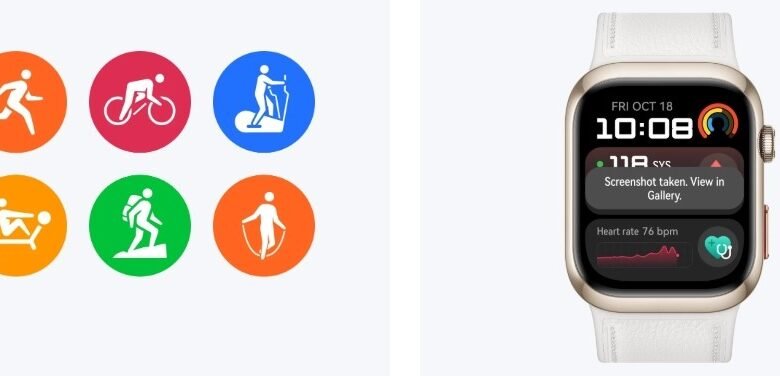Effective Heart Health Plans for Aging Adults

To maintain heart health, aging adults need tailored plans, including diet, exercise, stress management, and regular monitoring. The HUAWEI WATCH D2 simplifies this by offering continuous tracking of vital signs like blood pressure and heart rate. This real-time data helps seniors stay on track with health goals and quickly address any issues. By integrating these elements into daily routines, seniors can significantly improve heart health and overall well-being, leading to a better quality of life as they age.
What are the Key Components of a Heart Health Plan for Older Adults?
Importance of Diet in Maintaining Heart Health
A balanced diet is foundational to maintaining heart health in seniors. Incorporating fruits, vegetables, whole grains, and lean proteins can reduce cholesterol levels and blood pressure. Limiting salt, sugar, and saturated fat intake is critical. Foods rich in omega-3 fatty acids, like salmon and walnuts, support heart health significantly. Moreover, staying hydrated by drinking plenty of water aids in maintaining optimal blood flow and preventing dehydration-related cardiovascular strain. Supplements can play a supporting role, especially those recommended by healthcare providers, based on individual dietary needs. Awareness and mindful consumption of nutritious food contribute to a robust heart health plan.
The Role of Regular Exercise in Cardiovascular Health
Regular physical activity is vital for maintaining cardiovascular health. Activities such as brisk walking, swimming, or cycling enhance heart strength and overall circulation. The American Heart Association recommends at least 150 minutes of moderate-intensity aerobic exercise per week. For aging adults, incorporating resistance training twice a week can also help maintain muscle mass and metabolic health. Activities should be enjoyable and sustainable, gradually increasing in intensity to match one’s capability. Keeping an active lifestyle promotes heart health and improves mental well-being and physical resilience.
How to Manage Stress for Better Heart Health
Effective stress management is essential for heart health. Chronic stress can contribute to heart disease through increased blood pressure and unhealthy coping behaviors. Mindfulness practices, such as yoga and meditation, are powerful tools for reducing stress. Techniques like deep breathing exercises can lower heart rates and promote relaxation. Leisure activities, including hobbies, social interactions, and spending time in nature, can reduce stress levels. Aging adults must find stress-relief activities that resonate with them, assisting in safeguarding their heart health.
Why Should Aging Adults Monitor Their Blood Pressure and Cholesterol?
The Link Between High Blood Pressure and Heart Disease
High blood pressure (hypertension) is a major risk factor for heart disease. It causes the heart to work harder, leading to heart muscle thickening and potential heart failure. Consistent monitoring helps identify hypertension early. For instance, devices like the HUAWEI WATCH D2 allow continuous blood pressure tracking, providing average readings and trends. This data helps in understanding one’s heart health and making informed lifestyle adjustments. Proper medication, diet, and exercise can control hypertension and prevent potential heart complications.
How Cholesterol Affects Heart Health in Older Adults
Cholesterol levels impact heart health significantly. High levels of low-density lipoprotein (LDL) cholesterol can lead to plaque buildup in arteries, increasing heart disease risk. Conversely, high-density lipoprotein (HDL) cholesterol helps remove LDL from the bloodstream. Dietary changes, such as incorporating fiber-rich foods and avoiding trans fats, combined with physical activity, can help manage cholesterol levels effectively.
How Can Medications Help Aging Adults Maintain Heart Health?
Common Heart Medications Prescribed to Older Adults
Common medications for heart health include statins for cholesterol management, antihypertensives for blood pressure control, and anticoagulants for preventing blood clots. Beta-blockers, ACE inhibitors, and diuretics are frequently prescribed. Each medication serves a specific purpose in maintaining cardiovascular health. Aging adults must follow their healthcare provider’s recommendations to optimize the benefits of these medications. Regular check-ups ensure that the prescribed treatments are effective and adjustments are made when necessary.
Managing Medication for Optimal Heart Health
Adhering to prescribed medication schedules is crucial. Using pill organizers and setting reminders can help seniors manage their medication regimen. Devices like the HUAWEI WATCH D2 can monitor vital signs and remind users to take their medication. Regular consultations with healthcare providers are essential to review medication efficacy and adjust dosages accordingly. Keeping an up-to-date list of medications and their purposes can help aging adults manage their heart health better.
What Lifestyle Changes Are Essential for Seniors to Prevent Heart Disease?
Quitting Smoking and Limiting Alcohol for Heart Health
Smoking cessation is one of the most impactful steps for heart health. Smoking damages blood vessels, raises blood pressure, and reduces oxygen levels in the blood. Limiting alcohol intake is equally important as excessive consumption can lead to high blood pressure, heart failure, and stroke. Seeking support from healthcare professionals, using nicotine replacement therapy, and joining smoking cessation programs can assist in quitting. Moderation and mindful consumption of alcohol can significantly lower the risk of heart disease, contributing to overall health improvement.
The Importance of Sleep for Cardiovascular Health
Adequate sleep is vital for cardiovascular health. Poor sleep increases stress hormones, leading to high blood pressure and heart disease. Aging adults should aim for 7-9 hours of quality sleep per night. Creating a sleep-friendly environment, maintaining a regular sleep schedule, and avoiding caffeine or heavy meals before bedtime can improve sleep quality. Wearable technology like the HUAWEI WATCH D2 can monitor sleep patterns, providing insights to make necessary adjustments for better sleep hygiene and heart health.

Staying Mentally Active and Socially Engaged
Mental and social engagement is crucial for heart health. Activities that stimulate the mind, such as reading, puzzles, and learning new skills, can enhance cognitive function and reduce stress. Social interactions provide emotional support, reducing feelings of loneliness and depression, which negatively impact heart health. Joining clubs, volunteering, and maintaining family connections can help seniors stay mentally active and socially engaged. Keeping a healthy mind and active social life supports a heart-healthy lifestyle.
Conclusion
Creating and maintaining an effective heart health plan for aging adults is essential for a long, healthy life. Incorporating components such as a balanced diet, regular exercise, stress management, monitoring vital signs, and medication adherence ensures optimal heart health. Utilizing advanced tools like the watch d2 huawei can significantly enhance the management and monitoring of these health plans, providing real-time insights and comprehensive data to inform decision-making. Heart health goes beyond physical activities and includes mental and social well-being. Engaging in a holistic approach that addresses all aspects of health ensures that aging adults can lead fulfilling, active, and healthy lives. By making informed lifestyle choices and embracing supportive technologies, seniors can proactively manage their heart health and enjoy improved quality of life.





